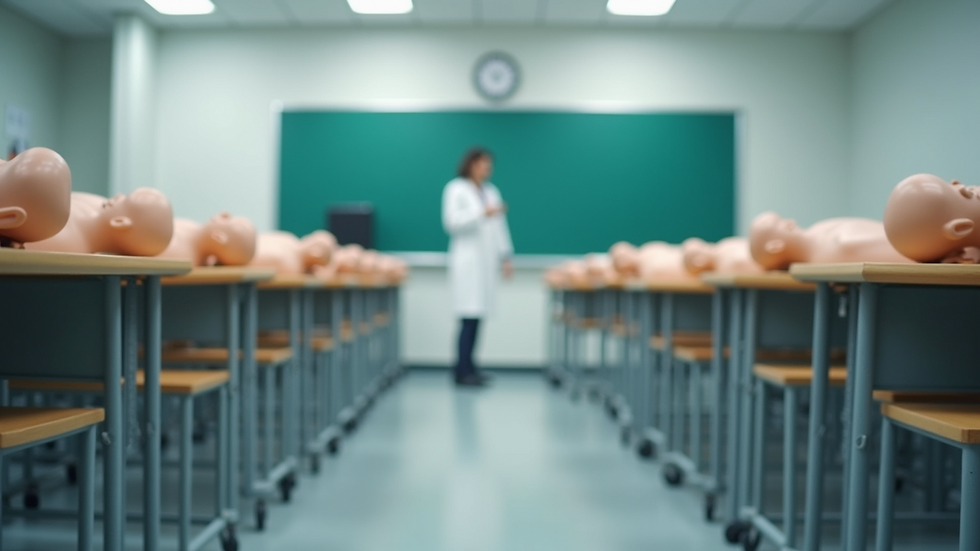First Aid classes | Cardiac arrest survivor to play college hoops
- Jul 13, 2020
- 3 min read

E.J. Galloway had just come off the court during a summer league basketball game when he suddenly collapsed. The seemingly healthy 16-year-old was in cardiac arrest.
His coach, Willie Swinney, knew exactly what to do. He started CPR. A parent from the opposing team, John Knight, joined him. They continued until paramedics arrived 15 minutes later.
“God had all the right people in the right place at the right time,” said E.J.’s mother, Ollie Galloway. “We know that CPR and God saved his life.”
E.J. doesn’t remember what happened that June 2, 2014. He does recall regaining consciousness three days later at the hospital.
“When I woke up, I was just hungry,” E.J. said. His legs were a little sore, but he was ready to play basketball again.
It would be six months before he could resume playing, doctors warned. “It broke my heart,” he said.
During his time sitting out, E.J. had an implanted defibrillator placed in his chest to help prevent future cardiac arrests. The device delivers an electric shock to restore a normal heartbeat if necessary.
“It’s just there for support,” said E.J., now 18 and a standout player in Mississippi. “I get to play as normal. It’s not stopping me.”
The 6-foot-9 power forward recently completed his senior season at Provine High School in Jackson.
“It was one of my best seasons in high school,” he said.
He has not had another heart episode like the one he experienced two years ago. Doctors don’t know exactly why he went into cardiac arrest that day.
“His heart rhythm, they told us it sped up so fast that it stopped,” explained Ollie.
E.J. has signed on to play college basketball at Mississippi Gulf Coast Community College, where he plans to study public health.
Already, E.J. is advocating for healthy lifestyles and medical research as an American Heart Association volunteer. He and his mom traveled to Washington, D.C., last year to lobby Congress for more National Institutes of Health funding.
“We try to bring awareness for what happened to me. We’re trying to do something positive. Anything can happen in the blink of an eye, before you know it. I believe you should live your life to the fullest,” E.J. said, adding that eventually he may write a book to inspire others.
E.J. emphasizes the importance of knowing CPR, especially among his peers.
“I believe they can learn quickly,” he said.
About 38 people each hour have a cardiac arrest while not in a hospital, and nine of 10 do not survive, according to AHA statistics. Yet receiving bystander CPR can double or even triple the victim’s chances of survival.
A new Mississippi law will phase in required CPR training for high school students in physical education or health classes. The Jackson Heart Foundation, partnering with the AHA, purchased a CPR in Schools kit for E.J.’s high school and other schools so that students can learn the lifesaving skill.
Swinney, the coach who performed CPR on E.J., said even though he had long been CPR-certified, he never thought he would need to use it. He and Knight have been recognized by city and school officials for what they did, and the city has “embraced” E.J., his mother said.
Ollie praised the way the coach never panicked and how others in the gym assisted in various ways.
“It was a team effort,” she said. “E.J. was a life that was saved.”
Learn more about First Aid classes. Bergenfield, NJ, Jersey City, NJ, Livingston, NJ, and Queens, New York and Gainesville, FL.
Source: https://newsarchive.heart.org





AV在线看 AV在线看;
自拍流出 自拍流出;
国产视频 国产视频;
日本无码 日本无码;
动漫肉番 动漫肉番;
吃瓜专区 吃瓜专区;
SM调教 SM调教;
ASMR ASMR;
国产探花 国产探花;
强奸乱伦 强奸乱伦;
代发外链 提权重点击找我;
蜘蛛池 蜘蛛池;
谷歌马甲包/ 谷歌马甲包;
谷歌霸屏 谷歌霸屏;
谷歌霸屏 谷歌霸屏
蜘蛛池 蜘蛛池
谷歌快排 谷歌快排
Google外链 Google外链
谷歌留痕 谷歌留痕
Gái Gọi…
Gái Gọi…
Dịch Vụ…
谷歌霸屏 谷歌霸屏
负面删除 负面删除
币圈推广 币圈推广
Google权重提升 Google权重提升
Google外链 Google外链
google留痕 google留痕
代发外链 提权重点击找我;
游戏推广 游戏推广;
Fortune Tiger Fortune Tiger;
Fortune Tiger Slots Fortune…
谷歌马甲包/ 谷歌马甲包;
谷歌霸屏 谷歌霸屏;
מכונות ETPU מכונות ETPU;
;ماكينات اي تي بي…
آلات إي بي بي…
ETPU maşınları ETPU maşınları;
ETPUマシン ETPUマシン;
ETPU 기계 ETPU 기계;
google seo google seo技术飞机TG-cheng716051;
03topgame 03topgame
gamesimes gamesimes;
Fortune Tiger Fortune Tiger;
Fortune Tiger Slots Fortune Tiger…
Fortune Tiger Fortune Tiger;
EPS машины EPS машины;
Fortune Tiger Fortune Tiger;
EPS Machine EPS Cutting Machine;
EPS Machine EPS and EPP…
EPP Machine EPP Shape Moulding…
EPS Machine EPS and EPP…
EPTU Machine ETPU Moulding Machine
EPS Machine EPS Cutting Machine;
google seo google seo技术飞机TG-cheng716051;
03topgame 03topgame
gamesimes gamesimes;
Fortune Tiger Fortune Tiger;
Fortune Tiger Slots Fortune Tiger…
Fortune Tiger Fortune Tiger;
EPS машины EPS машины;
Fortune Tiger Fortune Tiger;
EPS Machine EPS Cutting Machine;
EPS Machine EPS and EPP…
EPP Machine EPP Shape Moulding…
EPS Machine EPS and EPP…
EPTU Machine ETPU Moulding Machine
EPS Machine EPS Cutting Machine;